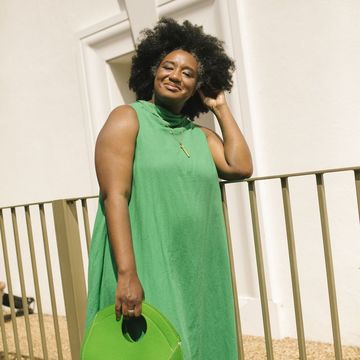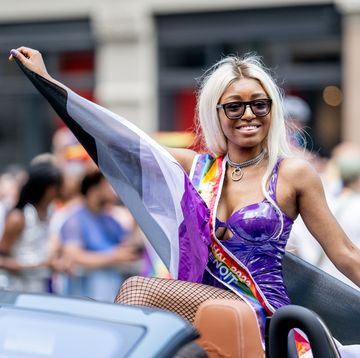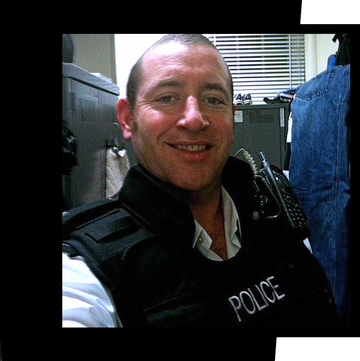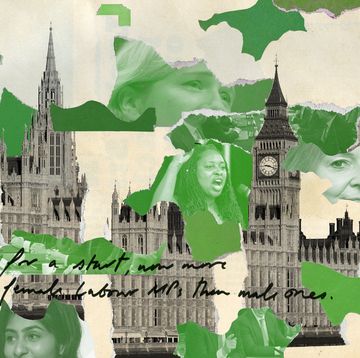When I landed the job of ELLE's transgender columnist in 2015, one of the column's aims was to chronicle my physical and emotional journey throughout the sex reassignment surgery.
With this being such a big, and very personal, decision which would involve an irreversible operation, I was reluctant to talk about it: I began to feel too vulnerable and exposed.
But now, after months of sharing my story, I feel it's time to address this subject once and for all.
At the start of my transition in 2012, sex reassignment surgery (SRS) was my goal, as it is for many other transgender women.
It seemed like the finishing line in my transition from man to woman, and the full stop I craved.
During my transition, I've attended regular appointments at the Gender Identity Clinic in London.
If you want to have SRS, you need to live in your preferred gender identity full time for at least a year.
This is known as 'social gender role transition' and it will help in confirming whether surgery is the right option.
At every appointment I presented as female, showed my payslips addressed to Rhyannon and took in press cuttings to prove I was legit.
After being assessed by four different psychologists I was given the green light - the go ahead for a vaginoplasty.
The NHS has enabled me to transition and allowed me to access voice therapy, counseling and hormones, which I couldn't have transitioned without. But I've also had a lot of emotional baggage to sort through too.
I mention this because it's important moving towards SRS that you have emotional and mental clarity, and you are 100 per cent certain it's what you want.
To transition is to seriously change your physical body, your role within society and the lives of those around you. It's a massive commitment and definitely not something to undertake on a whim.
Being a trans woman I was prescribed the primary female sex hormone oestrogen and introduced to regular injections that reduced my testosterone levels.
These are prescribed to align the chemistry of your body with that of a genetically born female. And for those individuals moving towards SRS, it is essential.
These prescriptions not only reshaped my physical body but also affected my emotions.
Case in point, one Saturday night in 2014 I was watching the BBC reality TV show The Voice, and when Tom Jones sang a duet with a female contestant I was flooded with emotion.
I literally found myself sobbing away into my TV dinner, with no clear reason as to why. It was obvious that my internal chemical balance was changing.
Before my transition, as Ryan, I was sensitive and emotional, but I had never cried like this before. This was new behaviour.
There are days when I find myself on the verge of an emotional tsunami and I don't know why.
My trans girlfriends all warned me that once I began hormone treatment I'd experience a rollercoaster of emotions every day – which in the beginning, I brushed off as hearsay, but having had so many tearful eruptions, they were right.
There is a stereotype that women are more emotional than men. With oestrogen flooding my system and hijacking my body, I definitely felt I fitted into this stereotype; it made me feel more womanly than ever before.
Many trans individuals don't want to discuss their genitalia or SRS, and I can understand why. It's a very personal, individual decision, with many of us feeling too defined by what's in our underwear. When a trans woman has a penis, her identity is often reduced to what she is moving away from, rather than towards.
Tabloid newspapers still use the words 'sex change' in a derogatory, ill-informed way – like we're living in some 1970s horror movie.
Which in turn, creates an inaccurate portrait of an individual's reasons behind the surgery.
SRS is nothing new. One of the first documented recipients was Lili Elbe in 1931 - Eddie Redmayne portrayed her in the film The Danish Girl.
Elbe died from contracting a severe infection after her fourth surgery – the implanting of a uterus and the construction of a vaginal canal.
It's easy to forget that this radical, ground-breaking surgery and Lili Elbe's bravery paved the way for many people today.
Since then, techniques and advancements in modern medicine allow for simpler, smoother, slightly less painful operations.
But like any major surgery, it doesn't come without potential complications, and a serious amount of aftercare needed post-surgery.
At my final assessment at the GIC I talked through the operation with a specialist, discussing every detail of the surgery, with its implications on my personal life and my mental health.
It was one of the most intense and nerve racking conversations I've ever had.
Walking away from that appointment I was 100 per cent certain that I'd made a clear decision and I was thrilled that after years of waiting, I would finally reach my goal.
Providing I met surgical criteria I would be having my vaginoplasty in early 2017.
Over the coming months I tried to put the surgery to the back of my mind, but it became a reality that was edging closer.
I started to feel anxiety around the surgery and re-examined my reasons behind this life changing decision.
When I'm in situations which reveal parts of my body – swimming, sun-bathing, going to a sauna, changing at the gym - I'm often called out as being a man. It can be uncomfortable, and it damages my self-esteem.
When I was using dating apps, unless my prospective partner was comfortable with a trans woman, then I'd often be dismissed. These experiences prevent me from living in a way that feels effortless and easy.
It's challenging, exhausting and upsetting.
The flesh that hangs between my legs defines my sex as male, it's this label that I've not always felt comfortable using or wanted to identify with. And aside from the life experiences, this was the primary reason I wanted the surgery. I wanted to escape that definition.
I had to ask myself honestly, over and over again, 'Did my genitalia disturb me so much to have my body irreversibly altered?'
What I really needed to do was to test drive a vagina first. I wondered how I could claim the need for one, without knowing what having one feels like. I clearly needed to address this decision with deeper thought.
I repeatedly woke up during the night, worrying and fretting over the details. What if, when I had my neo-vagina I still didn't feel comfortable with my body? And how would I adjust to this new body part?
I didn't hate my genitalia enough for it to be altered. I'd experienced shame around it from time to time but having a penis didn't feel wrong.
I began to realise that the decision I'd made about my body came from society's view of what a 'man' and a 'woman' should look like and how they should function.
It was then that I realised, my decision for surgery was based on other people's views and not my own. And ultimately I was going to alter my body for the needs and wants of other people.
Surely in 2017, aged 35-years-old, I didn't need to live up to somebody else's ideal?
The only way I've come to this decision has been by living and identifying as trans for the last five years.
The more I've experienced living my life in this way, the more I realise that I challenge the existing status quo.
Yes, sometimes this is painful, but presenting myself in this way is the place where I feel comfortable.
After months of introspection, I made the decision in late 2016 to postpone my surgery.
I'm not 100 per cent certain that having a vaginoplasty at this point in my life will make any difference to my lifestyle. In fact, I feel quite the opposite.
Nowadays, I relish my transgender identity and love the idea of projecting a different, alternative, fluid identity to the world.
I'm transgender - with the emphasis on 'trans'.
My identity moves beyond the physicality of genitalia. With my transition, there is no finishing line, and as far as I'm concerned, I have transitioned.
I will continue to move forward with my life, exploring the space which exists beyond mine and society's vision.
Who I am today, is who I am. I'm a proud transgender woman.













